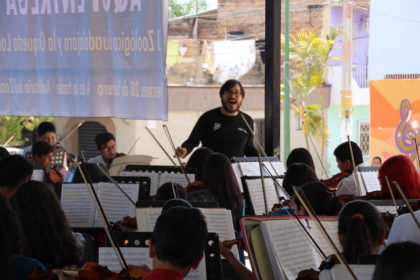
Our book Playing for Their Lives (playingfortheirlives.com) grew from our observations of teaching in El Sistema-inspired programs around the world, in over 25 countries and at over 100 program sites. This global faculty brings deep experience and skills to the shared global Sistema experiment; all share aspirations, and all are experimenting with ways to achieve these ambitious goals in intimate response to local conditions and culture.
To distill what we learned and reported in the broad reach of our book, we’ve decided to address this short essay directly to those who are now teaching and those who are interested in teaching in Sistema-inspired programs, to provide a handy summary of the elements and principles we’ve seen to be most important in Sistema teaching. What follows is necessarily abbreviated; in the pages of Playing for Their Lives, you will find these summarized principles fleshed out and described in action in programs across the world – not with a franchise approach or a uniform pedagogy, but as a set of shared principles and aspirations, and an ongoing inquiry into helping young people fulfill their potential through ensemble musical accomplishment.
Taken together, these principles amount to the creation of a distinctive learning environment – one that consistently fosters personal and social as well as musical development. Both kinds of development move in tandem, obviously; but we’ve seen that in young Sistema programs, in particular, creating the right learning culture often takes initial priority over developing a musical pedagogy.
We know that the set of priorities we describe below is impossibly ideal; no teacher could fully embody them all. However, we’ve seen that the implicit shared agreement of the global field is to aspire toward these ideals. Let them guide your ongoing development, and together, over time, we will all learn more about achieving them.
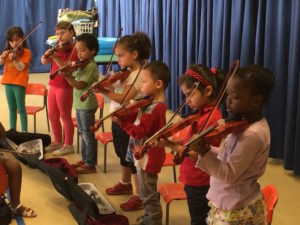
- Embrace radical inclusion.
Sistema programs welcome everyone into the work, regardless of background or ability. Every participant belongs and is valuable to the success of the music. We once asked Dudamel, “What is the secret to El Sistema’s success?” He answered two things, and one was: “We make sure that every single child feels valued.” (For the other thing, keep reading…)
Embracing full inclusion challenges the established meritocratic norms of the western classical music tradition. Great Sistema teachers recognize that this priority blazes a different pathway to musical excellence – and possibly an expanded definition of musical excellence, one that is not exclusively about technical perfection.
Not surprisingly, embracing full inclusion is hard. If the not-so-great clarinet player is an equally valued member of the high-aspiring orchestra, how can the ensemble become great?
That is the inquiry of El Sistema, and the marvel is that sometimes, with creative problem-solving, empathic imagination, and intensive practice, it can be achieved. And even when it can’t be achieved – still, the overriding priority for Sistema teachers is insistence on inclusion, because El Sistema’s core goal, more central even than excellent music-making, is to give every child a sense of belonging and being valued.
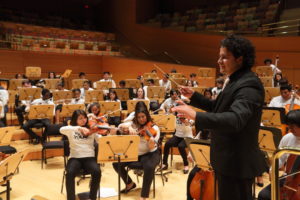
Juan Felipe Molano at YOLA (Craig Mathew Imaging)
2. Practice relentless positivity.
This wonderful term, spoken (in an interview we did with him some years ago) by Alejandro Carreno, concertmaster of the Simon Bolivar Orchestra of Venezuela, sums up a great deal of what we saw in great Sistema teachers around the world. “Relentless positivity” shows up as an impressively constant warm, upbeat vibe, manifested by each teacher in her or his own way. It shows up as support for what students know and can do musically (instead of criticism for what they can’t do) and as activation of those skills and knowledge, to help students toward personal ownership of the learning process. We sometimes say that Sistema teachers must wear “asset-based lenses” through which to see and affirm the strengths, improvements and capacities (however minute they may appear) of each student.
“Relentless positivity” also means consistently acknowledging student effort and process rather than student accomplishment. Much is known about nurturing “growth mindsets” (rather than “fixed mindsets”) in learners, and this body of work, originating in educational psychology, is more crucial to success in Sistema work than are any particular musical pedagogies. The WolfBrown-Longy research on Sistema learning finds that nurturing growth mindsets is a significant accomplishment of U.S. Sistema-inspired programs. With more awareness, we can do even better.[1]
What about the kids with whom relentless positivity fails? We heard in many countries that “behavior management” is the greatest concern of new Sistema teachers. Certainly, there are tools all good teachers use to keep groups of kids moving forward; if new Sistema teachers do not have a background in this toolkit, they will need some mentoring or guidance when getting started.
However, some of these tools are based in control consciousness – and Sistema programs are not. In applying the tools to achieve basic functionality in the rehearsal room, therefore, teachers need to make sure to adapt them so they do not squelch the essential priorities of Sistema programs. For example, in setting clear expectations about behavior and clear consequences for infractions, it’s ideal if these agreements are not imposed regulations but a shared set of recognitions, with students contributing, about what it takes to reach the ambitious goals of the group. If the expectations are truly shared, it becomes easier to deal with the challenges.
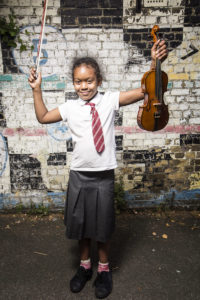
In Harmony London in Lambeth, England (Eric Politzer photo)
- Be in the intrinsic motivation business.
All good Sistema teachers prioritize practices that nurture intrinsic motivation. They know that to succeed in the bold Sistema endeavor, each learner must become driven by her own personal hunger to make things she cares about, and by the belief that she can accomplish difficult things, even very difficult things.
For many Sistema teachers, this means investigating their own teaching reflexes. Most trained musicians have experienced pedagogies that didn’t particularly prioritize intrinsic motivation, and may even have suppressed it in favor of the extrinsic motivators that dominate certain traditions of the Western classical music professions (i.e. winning competitions or getting high jury scores). Extrinsic motivators can certainly spur musical accomplishment, but they will not nurture the passion for creative engagement and collective accomplishment that we hope will become part of our students’ deep identities.
Tried-and-true music pedagogical tools are important, but not more important than nurturing intrinsic motivation, because the capacity for intrinsic motivation is something that will benefit students for the rest of their lives. If you don’t know about practices that foster intrinsic motivation, it’s important to do some research; you will be fascinated by how much has been discovered about such practices.[2]
We ourselves were fascinated to find that across the world, there were some variations in the ways intrinsic motivation was nurtured. In Venezuela and other Latin American countries, it was very much about students internalizing the goal of becoming better players or singers. We coined the phrase “passion provokes precision” to express this: students who personally cared about, and were personally invested in, the quality of the music they made often seemed to develop their technique faster than they might have if they had been motivated by compliance, reward-seeking, or teacher-pleasing. A passionate desire for the music to sound great can foster intense commitment to developing the technique necessary to make that happen.
By contrast, in other countries, particularly in Europe and North America, we observed that wherever we saw consistent priority given to composition and improvisation, we also saw more invested students. As a field, we are discovering promising ways to braid this set of skills – as well other non-performance skills such as music-listening skills – into the development of performance skills. We will all benefit from ongoing exchanges about the experiments and learning about the why, how and when of connections between intrinsic motivation and creative skills development.
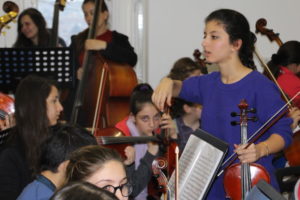
Music For Peace in Istanbul, Turkey
- Nurture peer support.
We have our Venezuelan friends and mentors to thank for the essentiality of the idea that every learner is also a teacher. Following their example, great Sistema teachers across the world give even their youngest students the clear message that helping their peers learn is both their responsibility and their privilege. Sistema teachers foster peer-support and peer-responsibility in many different ways, and over time they establish the norm that peer instruction and support is natural to the life of the program, because it advances the musical success that they all care about.
Equally important, it develops the internal capacity for empathy and for mutual understanding that is one of El Sistema’s highest goals. To teach someone else is to come to understand how that person learns. This kind of human reach into the internal reality of another is at the very core of the kind of citizenship Sistema programs aspire to develop.
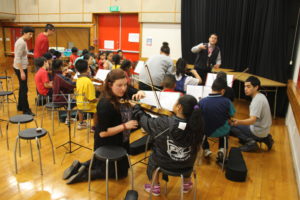
Sistema Aotearoa in South Auckland, New Zealand
- Radiate high energy and ambitiousness.
Perhaps the most common impression of visitors to the Venezuelan Sistema has been: “The teachers are so energetic, so fast-paced and urgent!” We found this kind of compelling energy in great Sistema teachers around the world. This doesn’t mean that quieter and more introverted musicians can’t be great Sistema teachers, but it does mean that such musicians dial up their energy to become driving and compelling in their own way. All strong Sistema teachers model the qualities of total investment, full attention, and joyful engagement that they want their students to grow into.
Sistema environments are, paradoxically, both safe and charged at the same time. Emotional and physical safety is an essential feature of any Sistema environment, crucial for students who experience stress and anxiety in many places in their lives. But safety is not enough; safety alone does not foster intrinsic motivation. So in dynamic balance with safety are the qualities of excitement, driving energy and bold ambition. The balance between safe and charged often shifts back and forth as a program evolves, but both are always present.
We recognize a pattern in many programs. In the early years of some programs, faculty and administrators prioritize the development of the Sistema-esque learning culture above musical ambition. This seems natural and wise, since the culture that embodies the principles in this essay can be slow to evolve in intimate response to the particularities of the students and community. It can take years of experimentation and communication among teachers to begin to feel they have found the inner environment they want. At that point, there is usually a shift into a higher gear of musical ambition – because the social goals of Sistema can only be achieved if students are truly accomplishing at a high level. But Sistema success requires that the musical achievement grow within the embrace of the right learning environment. There’s no pedagogical short cut.
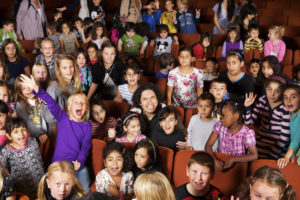
Gustavo Dudamel with children of Sistema Sweden
- “We never forget fun”…
You guessed it: that was Dudamel’s second answer to the question of what makes El Sistema successful. We hasten to add that what Gustavo meant by “fun” may not always be recognizable to North American eyes, accustomed as we are to think of fun as goofy or giggly and fairly mindless – basically, the opposite of seriousness. The fun of Sistema learning is a deep sense of play – sometimes lightly playful, but often seriously playful.
The ongoing inquiry for Sistema teachers is how to let a sense of engaged play guide the manifold aspects of music learning, even when the tasks at hand are ambitious and hard. There are many ways this pedagogical marvel is accomplished. The fun may include games, but it emerges at least as much from a feeling of play throughout rehearsals that look pretty serious. The question a Sistema teacher regularly asks herself is, “How can I structure the learning time with fast-moving, interesting challenges that develop musical relevance and technique?”
If you can do this successfully, even some of the time, your students will naturally develop the capacity for discipline – a word that doesn’t mean simply knuckling down, but derives from the Latin for learning or knowledge. Young learners internalize sustainable habits of discipline through a series of pleasurable successes in learning how to meet challenges they care about, not through repeatedly being forced, or forcing themselves, through things that don’t mean much to them, or that they find unpleasant.
The importance of play derives from the truth of the pleasure principle—people move toward that which feels good, and away from that which doesn’t. (So do animals, plants, and amoebae – it is a life truth.) But there are many levels of “feeling good,” ranging from the most elemental physical pleasures to more complex kinds. We think of the long journey of a learner’s development over years in a Sistema program as a steady expansion in the kinds of pleasure they learn to access. From the pleasure of a musical game or a first plucked string, to the pleasure of helping a stand partner succeed in a difficult passage, to the pleasure of successful practice for 15 minutes (and eventually for three hours), to the pleasure of struggling with the orchestra to pull off a really hard piece, to the pleasure of experimenting with improvisation or composition or making an arrangement of a beloved song for the family to sing – all the way to the pleasure of taking on a hard creative challenge in a school science project or college application. Growth mindset makes this journey possible; fixed mindset makes it almost impossible.
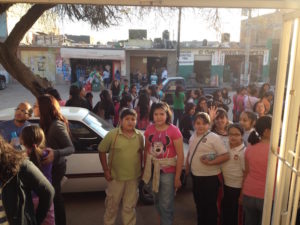
Núcleo in Guatire, Venezuela
- Connect to families and the wider community.
Family members are a crucial part of the support team for each learner, and therefore good teachers and programs steadily and sensitively seek to draw them into greater engagement over time. As much as possible (and we know that often this is difficult at best), teachers need to reach out to parents and caregivers about the best ways they can support students to learn in ways that align with Sistema priorities. Since family support is a significant contributor to student success, teachers must be relentlessly inclusive and positive with caregivers as well as students, seeking what works for each. Caregivers as well as students need to be provided with pleasurable learning that increases their wish to contribute to the program.
Also important, of course, is communication with students’ communities. This serves multiple purposes. One, it helps elevate the community’s awareness and appreciation of the students’ accomplishments. Two, it keeps each program responsive to the values and needs of its community, helping programs stay relevant and expanding ways to become valuable. And three, it builds trust between program and community, as teachers become personally known and respected. This connection blooms in community performances. Sistema teachers are ambassadors for their programs, and ambassadors must be present and engaged to be successful.
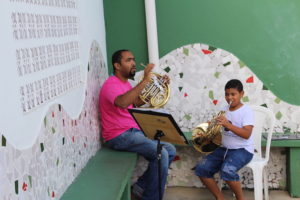
NEOJIBA in Salvador, Brazil
- Embrace The Law of 80%
Our last principle isn’t really a law; we just formulate it that way to give it some extra gravitas. It expresses our conviction that eighty percent of what you teach is who you are. It’s true for all teachers – but perhaps especially important for Sistema teachers, who spend vastly more time with their students than do private-lesson teachers.
This could feel daunting, we know – “Am I supposed to embody every one of those last seven principles, every minute?” – but we mean it more as a way you can embrace this work. No, you don’t need to embody every principle, every second. But you do need to remember that your success as a teacher lies in who you are to your students, more than the specific pedagogies you introduce. Your students need more than the many aspects of good musical technique you can provide; they need your belief in them, your passion, and your full artist self.
This means you’ll have to resist the “gig” mentality that so many freelance musicians and teachers bring to their multiple part-time jobs, which we see as the single biggest challenge to deep success among Sistema faculties. That mentality is understandable, and pretty standard given the realities of musicians’ career realities. But Sistema aspirations are not standard.
To help young people redirect the trajectory of their lives away from entrenched poverty, racism, and class-ism – a goal that most well-funded social service efforts fail to achieve – takes more than normal input from teachers. You join this work not for the money (lord knows!), but because you recognize the potential to change the world through music. For young people to attain the highly ambitious goals of Sistema, they have to commit themselves fully to the opportunity. The least their teachers can do, must do, is to authentically model that commitment – to live that whole-self commitment with students every day.
If you bring to your teaching your full energy and aliveness…
If you hold this work as just as important as your artistic work…
If you pay full, respectful attention to each student, as much as possible…
And if you have a fire in the gut for every one of them, including the ones who aren’t so easily loveable…
…that’s the 80% that your students will take away with them, and that will inform, in ways both subtle and large, they way they go about their lives.
Conclusion
Each of these principles involves challenges. Teaching in El Sistema-inspired programs is an ongoing inquiry into these challenges; there are no fixed answers. That’s why time for faculty experimentation and exchange is so crucial, and why Sistema teachers benefit so much from being in touch with teachers in other programs. You are all pioneers, and you all need collegial dialogue to guide and share your learning. We are always smarter and more effective together than when working separately.
We sometimes refer to El Sistema as a “generous laboratory” for the entire music education ecosystem. In relation to music teachers in more conventional settings, Sistema teachers enjoy some valuable advantages for learning about issues that all music educators care about. These advantages include lots of hours with students, greater freedom to experiment, more direct contact with families and communities, more frequent performances, and a network of like-spirited colleagues in an exploratory movement to change lives and communities.
So we hope you will view yourself as a fortunate learner for the wider field of music educators, and share what you learn. Many in this wide field have decades of experience, and much to offer Sistema programs, so we need to sustain a generous, sharing mindset not only between colleagues in the Sistema-inspired field, but also between colleagues in the larger field of music education.
— Tricia and Eric
[1] Recommended reading: Mindset: The New Psychology of Success, by Carol Dweck
[2] Recommended reading: Drive, by Daniel Pink